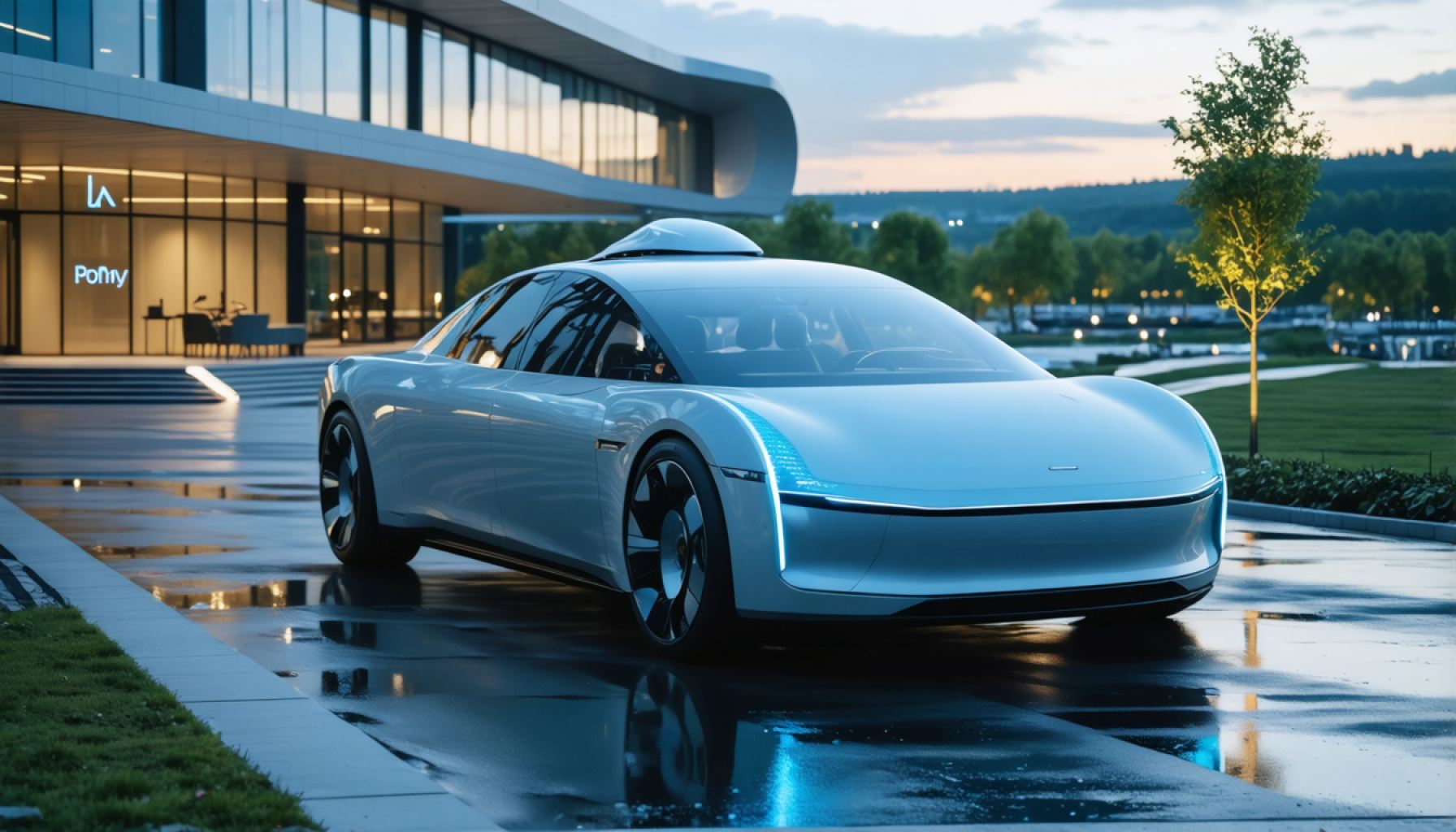
- Luxembourg has begun testing Level 4 autonomous vehicles, following approval from the Ministry of Mobility and Public Works.
- Pony.ai, in partnership with Emile Weber, aims to integrate self-driving technology into Luxembourg’s public transit system.
- A Memorandum of Understanding, signed in March 2024, outlines Pony.ai and Luxembourg’s strategic collaboration for autonomous mobility.
- The partnership focuses on safety, efficiency, and investments in local talent to revolutionize transportation.
- Dr. James Peng and Minister Yuriko Backes foresee Luxembourg leading Europe’s autonomous driving innovation.
- Pony.ai, founded in 2016, expands its reach from China to global markets, including the U.S. and South Korea, aiming for a cleaner, smarter future.
- This move highlights Luxembourg’s role in pioneering autonomous technology and transforming urban transport.
Luxembourg, a beacon of innovation nestled in the heart of Europe, has embarked on a journey into the future with Pony.ai’s autonomous vehicle technology. Ponyl.ai, renowned for its relentless pursuit to redefine transportation, has secured the green light from Luxembourg’s Ministry of Mobility and Public Works to test its cutting-edge Level 4 autonomous driving.
The fluttering Luxembourg flag marks not just the country’s rich history, but now its leap into a pioneering role in autonomous mobility. The European expansion of Pony.ai, initially seeded with the establishment of their research and testing hub in September 2024, cements this small nation’s big ambitions. The momentous deal surged forward with a Memorandum of Understanding signed back in March 2024, crafting a robust alliance between Pony.ai and the Luxembourg government.
Behind this pivotal movement is a powerful partnership with Emile Weber, a prominent Luxembourgish mobility provider. Together, they craft a narrative that intertwines technological efficiency with transportation needs, aiming to weave self-driving technology seamlessly into the fabric of Luxembourg’s extensive network of public transit and tourism.
At the helm of this operation, Dr. James Peng, co-founder and CEO of Pony.ai, envisions Luxembourg as a vanguard of autonomous mobility in Europe. His sentiments resonate with the government, as Yuriko Backes, Minister for Mobility and Public Works, champions the strides towards a smarter, safer future of driving. Backes emphasizes the transformative potential of this technology and the government’s commitment to propelling technological advancements.
The essence of this partnership is rooted deeply in strategy and vision. The memorandum is not just a document, but a manifesto of investments in local talent, a boost to operational capabilities, and an avenue to revolutionize transportation safety and efficiency. Moreover, it’s a testament to Luxembourg’s aspiration to be at the forefront of Europe’s autonomous driving renaissance.
Pony.ai, founded in December 2016 by visionaries James Peng and Tiancheng Lou, harbors a mission so grandiose it encompasses continents. Headquartered in Guangzhou, China with operational footprints in Silicon Valley, their ambition stretches across worldwide circuits, including trails blazed in regions like South Korea and the United States.
In a world where urban landscapes are cluttered with traditional combustion engines, Pony.ai’s fleet promises a cleaner, smarter route. Thousands of tests, miles of autonomy, and countless innovations later, Pony.ai faces its next giant leap: transforming an entire nation into an incubator for automated driving technologies.
As these autonomous vehicles start their silent engines and glide onto Luxembourg’s roads, they carry with them not just passengers, but the promise of the future: a world where transportation is effortless, emission-less, and bound by no human imperfection.
Luxembourg Leads the Way in Autonomous Vehicle Innovation
Introduction to Luxembourg’s Autonomous Vehicle Initiative
Luxembourg’s partnership with Pony.ai signifies a pivotal moment in the development of autonomous vehicles. This collaboration aims to redefine transportation within the region, heralding a new era of smart, safe, and clean driving. The alliance is not just a technological leap but a strategic move placing Luxembourg at the forefront of Europe’s autonomous vehicle revolution.
Expanded Insights & Analysis
1. Pony.ai and Luxembourg: A Strategic Partnership
Pony.ai, a powerhouse in autonomous vehicle technology, combines its cutting-edge capabilities with Luxembourg’s strategic vision. This partnership is expected to bolster Luxembourg’s infrastructure by integrating autonomous technology into public transit networks. Explore more about Pony.ai.
2. Emile Weber’s Role
Emile Weber, a renowned Luxembourgish mobility provider, is integral to this initiative. Their collaboration ensures the seamless integration of autonomous vehicles into existing mobility solutions, enhancing connectivity and efficiency in Luxembourg’s public transportation system.
3. Autonomous Levels Explained
Pony.ai is operating at Level 4 autonomy, which implies vehicles can handle most driving tasks independently in designated areas without human intervention. This level is a crucial step towards achieving full autonomy (Level 5), where vehicles can operate in all conditions without any human input.
4. Environmental Impact
The shift to autonomous vehicles aligns with global sustainability goals. Pony.ai’s fleet is expected to reduce emissions and promote a cleaner urban environment, as autonomous vehicles are designed to operate efficiently, minimizing wasteful energy use and emissions.
Trends and Future Predictions
The global autonomous vehicle industry is projected to grow significantly, with technological advancements and safety improvements pivoting the course. By investing early, Luxembourg positions itself as a testbed for future innovations, potentially attracting more tech companies to the region.
Market Trends: By 2030, autonomous vehicles are expected to comprise a substantial portion of new vehicle sales in Europe, influenced by legislative support and technological advancements.
Technological Advancements: With AI and machine learning at the core, autonomous vehicles will become increasingly adept at navigating complex urban environments, reducing accidents, and enhancing traffic flow.
Key Questions Answered
How will autonomous vehicles impact job markets?
While there are concerns about jobs in traditional driving fields, the transition to autonomous vehicles will create new opportunities in tech, vehicle maintenance, and logistics.
What are the potential safety implications?
Autonomous vehicles are equipped with advanced sensors and AI algorithms, significantly reducing human error, which is a leading cause of accidents. The transition will undergo rigorous testing to ensure safety standards are met.
What are the economic implications?
This initiative may boost Luxembourg’s economy by attracting tech startups and investments, enhancing its reputation as an innovation hub.
Quick Tips for Readers
– Stay informed about the latest developments in autonomous vehicle legislation and adoption.
– Explore opportunities in the growing field of autonomous vehicle technology and related industries.
– Consider sustainability, safety, and efficiency when exploring autonomous transport options.
Conclusion
Luxembourg’s step into autonomous vehicle technology with Pony.ai marks a significant transition towards a future of improved transportation solutions. As these innovations unfold, they promise a realm of possibilities, including enhanced safety, reduced emissions, and increased operational efficiency. For Luxembourg, embracing autonomy isn’t just a leap into the future—it’s a commitment to being a leader in technological innovation.
For further information and industry insights, visit the official sites of Luxembourg’s Ministry of Mobility and Public Works and Emile Weber.



